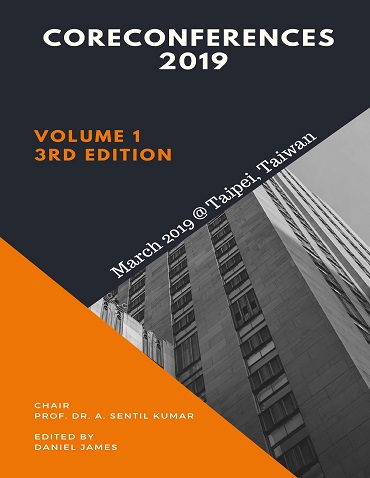- Publication Meta:Value
- Short Title:CC Batch A 2019
- Publisher:ASDF, India
- ISBN 13:978-93-88122-06-1
- ISBN 10:93-88122-06-2
- Language:English
- Type:Hard Bound - Printed Book
- Copyrights:CC Batch A Organizers/DCRC, London, UK
- Editor-in-Chief:Dr A Senthilkumar
- Conference Dates:20 - 21, March 2019
- Venue Country:Taipei, Taiwan
- Submitted Papers:227
- Acceptance Rate:8.51%
- Website:www.coreconferences.com
Welcome to ASDF Electronic Digital Library!
CoreConferences 2019
CoreConferences 2019
International Conference on Universities and Women's Studies 2019
Paper 021
Exploring the Experiences of Gender–Based Violence and The Associated Psychosocial and Mental Health Issues of Filipino HIV–Positives: Implications for Psychological Practice
Evangeline R Castronuevo–Ruga1, Normita A Atrillano2
Abstract
The phenomenon of gender–based violence has generated attention from research practitioners and helping professionals since the surge of the women's movement three or so decades ago in the Philippines. At about the same time, the HIV–AIDS gained similar attention with the disclosure of the first ever case of the country in the mid–80s. Only recently, however, has the intersectionality of these two phenomena been looked into by the research community in other countries and has yet to see parallel response locally. This research, therefore, attempts to map out the lived experiences of People Living with Human Immuno Deficiency Virus (PLHIV) who have undergone gender-based violence (GBV). It specially looks into the consequent psychosocial and mental health issues. Using focus group discussion with 24 purposively sampled participants from the highly vulnerable groups based in three major Philippine cities, thematic analysis reveals that the participants experienced various forms of gender–based violence, e.g., sexual, emotional⁄psychological, economic, verbal, physical) and expressions of stigma and discrimination, which in turn, led to manifestations of different emotional and psychological trauma, depression, internalized homophobia, greater health risks and risk–taking behaviours, among others. It might be worthwhile to consider the possibility that the consequent risk–taking and self–injurious tendencies played a role in their eventual contraction of HIV.
Keywords
Author's Profile
Author profile can be generated and linked through our partners World Book of Researchers. To include your profile online Click Here. After it is approved, please email to edlib @ asdf.res.in to create a link with all the papers.
e-AID
CoreConferences.2019.021
Cite this Article as Follows
Evangeline R Castronuevo–Ruga, Normita A Atrillano. Exploring the Experiences of Gender–Based Violence and The Associated Psychosocial and Mental Health Issues of Filipino HIV–Positives: Implications for Psychological Practice. International Conference on Universities and Women's Studies (2019): 12. Print.
© 2010 - by EDLIB .
All Rights Reserved.

